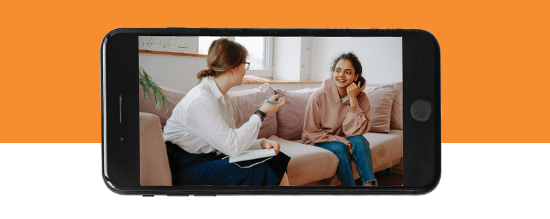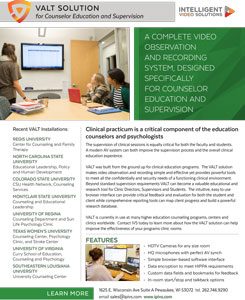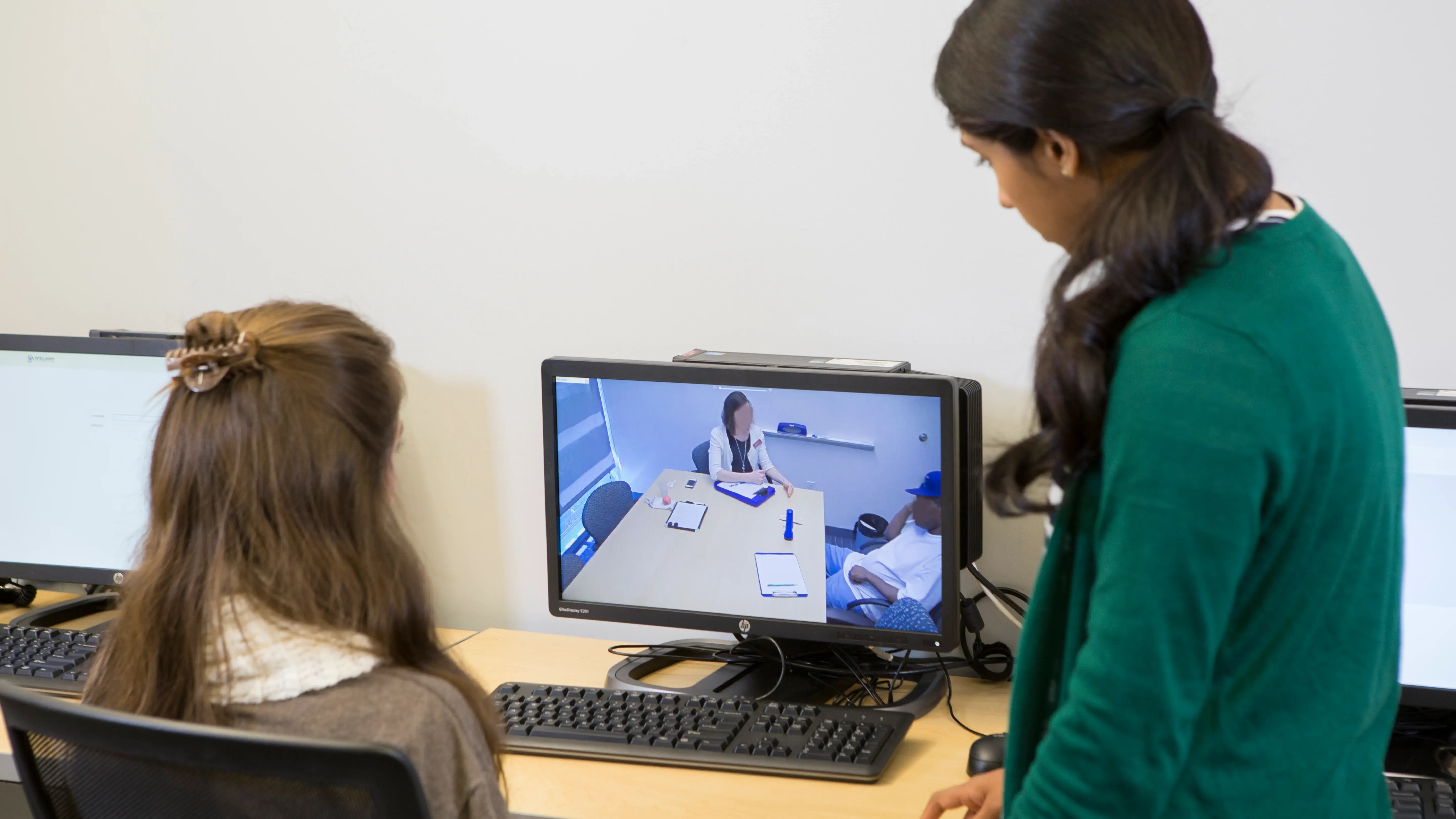Recording Social Work Simulation Sessions
When a student’s simulation session is recorded, an educator can take their time reviewing a student’s performance. With a recorded video, an educator can pause, rewind, and fast-forward as needed to ensure they don’t miss a single moment. In addition, educators can review the video with the student so that the student can see exactly what they are doing and understand how to correct their behavior for next time.
Ease of Use
The VALT solution is a simple but powerful tool. Basic observation and recording tasks are intuitive without the need for any extensive training or technical support. Our interface minimizes complexity and points of failure so that critical educational tasks are never missed.
Scalable Solution
VALT utilizes a browser-based application, making video accessible with the proper permissions simple. Scale to any number of cameras and users all while incurring no per client license structures or budget-crushing annual maintenance contracts.
HD Video & High Quality Audio
Integrate with high-definition network cameras. Observe and record with pan-tilt-zoom (PTZ) and fixed cameras for 1080p video. Eliminate hum with microphones and audio equipment that provide exceptional audio quality.

Features for a more seamless and secure social work training

Security
Comprehensive user management rights, a detailed audit log, encryption, network architecture, and authentication make all clinical video content fully secure. Video sessions are available only to those who possess the necessary permissions.
Searchable Database
All of the videos are stored and managed by a built-in searchable database. Tag videos with data such as student/client name or therapy type for easy lookup and review.
Talkback
Instructors can talkback into any room to provide live feedback using our browser based software client. On the other end the clinician typically wear a small earpiece.
Case Study
TWU Leverages VALT for real patient observations
Prior systems didn't provide the audio and video quality necessary for adequate learning and reflection. TWU switched to VALT to provide the upgrade in quality while providing an exceptional level of control and access for all users.
Learn more about our audio video recording solutions.

Mobile Recording for Social Work
OSCE for Social Work
While the most obvious use of a video system for social work is education, it has many additional uses as well. For example, OSCEs (Objective Structured Clinical Examinations) are quickly being adapted for the world of social work. Generally used in health sciences, an OSCE is usually comprised of a circuit of short stations in which each student is examined on a one-to-one basis with one or two impartial examiners and either real or simulated patients.
To properly evaluate a student taking an OSCE, it is important to remain as objective as possible and the best way to do that is to not be forced to evaluate in the heat of the moment or off memory alone.
Scientific studies have shown that real-time evaluation and video reviews tend to produce a significant difference in evaluations and ultimately pass/fail determinations. By utilizing video recording for student examinations, an educator has the best opportunity to remain as objective and impartial as possible and provide a student with the best possible evaluation.
Effective Use of A/V Capture in Higher Education
Explore how A/V capture technology can transform educational environments, enhance learning experiences, and streamline administrative processes in higher education institutions.
Get the Guide
Our Services
FAQs for Social Work Recording and Research
When it comes to providing a well-rounded education for students pursuing a career in social work, textbooks and class discussion simply is not enough. Real-world experience and practice of the theories are important aspects to help a student develop the skills needed to enter their career. Doing rather than seeing can allow students to test what they learned inside the classroom and see their knowledge in action. Additionally, real world experience is the only way students can develop the soft skills that are difficult to teach and are required as a social worker.
Although most of a student’s hands-on social work is done with peers, teachers, or even with actual clients, some social work educators are adapting simulation for their own training needs. Predominantly used in healthcare professions such as medicine and nursing, simulation is growing in popularity among social work educators.
While simulation in the world of nursing and medicine generally utilizes low and high-fidelity manikins for students to test their skills, social work simulation enlists real people (referred to as standardized patients) for students to test their skills with.
Standardized patients are trained to imitate many common and rare situations a student will face during their career. One major benefit using standardized patients provides is the ability for students to experience uncommon or even potentially dangerous scenarios in a safe environment where they can learn without fear or undue stress. This gives students practice on situations that may be rare, but they will still need to be prepared for.
While implementing standardized patients into your social work education curriculum has the potential for massive education benefits for students, there is one more step needed to maximize your training efforts.
Debriefing is an essential part of social work and other health sciences education. Discussing what went well and what needs improvement with a student is one of the final keys for real knowledge retention and helps students understand what to focus on in their studies.
However, debriefing off memory alone has its own drawbacks. It can be easy for educators to miss tiny details when trying to watch a situation closely and also evaluating a student’s performance at the same time. Additionally, when a student receives feedback on their performance, it can be difficult for them to remember or visualize what they were doing and how they should correct that behavior.
This is why most training and education simulations (whether with a manakin or standardized patient) are being recorded.
Our VALT audio/video system enhances the learning experience and skill development of social work students by:
- Integrating simulation and video recording into the curriculum
- Providing a safe practice environment with standardized patients and realistic scenarios
- Enabling detailed review, self-reflection, and targeted feedback through recorded simulations
- Creating a library of case studies and examples for future training
Our audio/video solutions provide a robust platform for implementing Objective Structured Clinical Examinations (OSCEs) in social work education.
OSCEs are increasingly being adopted in social work programs to assess students' clinical competencies and readiness for practice. The VALT system's video recording capabilities enable the creation of a structured and standardized assessment environment. Examiners can observe and evaluate students' performance in real-time or review the recordings later for more detailed analysis. The system's multi-camera setup allows for comprehensive coverage of the OSCE stations, capturing different angles and perspectives of the student-patient interactions. The high-quality audio recording ensures that all verbal communications are documented for accurate assessment.
The VALT system's marker and annotation features enable examiners to highlight specific moments, add comments, and provide precise feedback to students. The recordings also serve as evidence of student performance, facilitating the moderation and standardization of OSCE results. Furthermore, the system's secure video storage and access controls ensure the confidentiality and integrity of the OSCE recordings, meeting the necessary ethical and legal requirements. By leveraging the IVS VALT system, social work programs can enhance the reliability, validity, and efficiency of their OSCE assessments.
Our audio/video system prioritizes the privacy and security of sensitive client information captured during social work simulations or recordings. The system employs a multifaceted approach to safeguard data and ensure compliance with relevant regulations, such as HIPAA and HITECH. All video recordings may be encrypted during transmission and storage, preventing unauthorized access or interception. The system features granular user management and access controls, allowing administrators to define roles and permissions based on the least privilege principle, ensuring that only authorized individuals can view, edit, or share specific recordings.
The VALT system also maintains detailed audit logs, tracking user activities and system events for accountability and monitoring. Regular security updates and patches address any vulnerabilities and maintain the system's integrity. Additionally, the IVS team provides guidance on best practices for data governance, including secure storage, retention policies, and user training on privacy protocols. By implementing these robust security measures and adhering to industry standards, the IVS VALT system creates a trusted environment for capturing and managing sensitive social work simulations and recordings.
We designed our audio/video solutions to be highly user-friendly, accommodating social work educators and students with varying levels of technical expertise. The system features an intuitive, streamlined interface, allowing users to easily navigate and access key functions. The recording process is straightforward, with simple controls for starting, stopping, and managing recordings. Educators can quickly schedule simulation sessions, specifying the desired cameras, recording duration, and video metadata.
The browser-based platform eliminates the need for specialized software installations, making it accessible from any computer or tablet connected to the network. Students can review their recorded simulations and receive feedback through the same user-friendly interface, promoting engagement and self-reflection. The system also offers mobile compatibility through the IVS Beam app, enabling remote access and recording using iOS devices.
Comprehensive training materials, including user guides, video tutorials, and live support, are available to help users familiarize themselves with the system's features and functionalities. Our experienced team provides ongoing technical assistance and support to promptly address any questions or concerns. By prioritizing user-friendliness, the IVS VALT system ensures that social work educators and students can focus on the learning experience rather than grappling with complex technology.
Our VALT audio/video system supports the assessment and evaluation of social work students' competencies and progress by:
- Offering video recordings of simulations and practice sessions as a rich data source
- Providing tools for highlighting key competencies and areas for improvement
- Enabling longitudinal tracking of student's progress and growth
- Generating reports and analytics on performance trends and skill acquisition
Our audio/video solution provides a platform for collaboration and knowledge sharing among social work educators, researchers, and practitioners. The system's centralized video library allows for creating a shared repository of simulations, case studies, and best practices. Educators can curate and organize recordings based on specific themes, interventions, or client populations, making it easier for colleagues to access relevant content.
The system's secure sharing features enable educators to collaborate with peers fostering a community of practice and promoting exchanging ideas and experiences. Researchers can leverage the recorded simulations to conduct studies on social work education, clinical interventions, or student learning outcomes.
The VALT system's search and metadata capabilities facilitate the identification of relevant recordings for analysis, supporting evidence-based research and scholarship. Practitioners can benefit from accessing the video library to enhance professional development, learn new techniques, or seek guidance on complex cases.
Additionally, the IVS VALT system can support the dissemination of knowledge by creating educational content, such as training modules and case study libraries. The IVS VALT system advances social work education, research, and practice by fostering collaboration and knowledge sharing.

VALT for Counselor Education and Supervision
- Intelligent Video Solutions
- Solutions
- Clinical Skills
- Video System for Social Work Education




